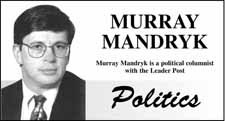For farmers who have grown to despise the Canadian Wheat Board, the election of a federal Conservative majority is the best news in decades.
At long last, the board will meet its end, via a government with the votes in House of Commons votes and the will to dismantle it.
But is there a better course of action for Prime Minister Stephen Harper's government?
Before Conservatives blow up the board, there are a couple critical issues to consider.
Now, don't get me wrong. You will not hear a lot of fussing and fuming from this corner of the newspaper should a long-overdue overhaul of the Wheat Board finally come to fruition.
The CWB - at least as it currently exists - has likely outlived its use as a single-desk seller. Massive improvements in information technology and marketing skill sets of farmers mean that most truly do have the capacity to make proper marketing decisions for themselves. Make no mistake that - at the absolute minimum - we will soon be looking at very different CWB. And notwithstanding the fear and loathing from those who suggest that the Wheat Board can only exist as a single-desk seller, there is actually a pretty good argument that it could exist very well, as a leaner, meaner entity.
For one thing, the board already allows farmers the option of buying back their wheat and selling it on the open market. But beyond the philosophical argument of why farmers should have to take back their grain to sell, the practical problems this presents are enormous.
For another thing, the notion that farmers are enjoying some massive advantage from the board as some sort of monopoly cartel are really overstated. And the lack of nimbleness and flexibility associated with dealing with the board can, potentially, put farmers at a serious disadvantage.
That said, to suggest, as CWB opponents have, that the board is completely useless or that there would be no consequences associated with its disappearance is both wrong and perhaps a little dangerous.
Consider, for the moment, the rumblings one is increasingly hearing from canola producers about the lack of marketing options they are currently dealing with in a free-market system.
The simply reality is that the board could still likely exist serving a different, but still valuable function as voluntary marketing agency for producers. It would require some thoughtfulness. And it would certainly require a lot of flexibility for both sides deeply entrenched in their positions that either the CWB is untouchable or has to be blown up altogether.
The problem is, there's little to indicate that Agriculture Minister Gerry Ritz and the federal Conservatives have any intention of being smart or flexible about the board's future.
Ritz's first proclamation after the election is that a majority government means the voters have spoken. This, of course, is nonsense. The general election was hardly a referendum on the CWB's existence. (It's also more that a little hypocritical, given the penchant of Ritz and others to meddle in past CWB board democratic election through gag orders on board executives or arbitrary changing voters' lists.)
Moreover, Liberal MP Ralph Goodale rightly points out that the federal Conservative government would be breaking its own law by abolishing the CWB as a single-desk seller without a plebiscite.
Rash action may lead to court challenges the Conservatives would likely win.
If the Conservatives were smart, they would allow a producers vote after thoughtful amendments to the CWB's operations that could inject some much need flexibility into its operations.
If the amendments were smart and thoughtful, Conservatives might even convince practically minded farmers of the benefit of change. After all, when have farmers ever opposed change that was to their own benefit?
The federal majority Conservative should be smart - not rash - in how they handle the CWB.
Murray Mandryk has been covering provincial politics for over 15 years.




